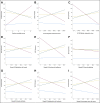The Influence of Personality on Health Complaints and Quality of Life in Women With Breast Implants
- PMID: 36073675
- PMCID: PMC9896140
- DOI: 10.1093/asj/sjac247
The Influence of Personality on Health Complaints and Quality of Life in Women With Breast Implants
Abstract
Background: A causal relation between systemic symptoms and breast implants has not been established. Psychological factors, such as personality and psychological distress, are strongly associated with the development of medically unexplained symptoms. It can be hypothesized that psychological factors may be related to the development of breast implant illness (BII).
Objectives: This study was conducted to evaluate the correlation between self-reported health complaints, health- and breast-related quality of life (QoL), and personality, in women with cosmetic breast implants.
Methods: Women who attended the plastic surgery outpatient clinic of Maastricht University Medical Center between October 2020 and October 2021 for reasons related to their implants and women recruited for a BII study at the Center during this period were invited to participate in this study. Only women who underwent cosmetic breast augmentation were eligible. Participants completed a physical complaints score form and the BREAST-Q, SF-36, and EPQ-RSS questionnaires via an online survey.
Results: In total, 201 women completed the questionnaires. Extroversion and social desirability were predominant personality traits in women with breast implants, followed by neuroticism. Relatively high levels of neuroticism were found compared with normative data. Neuroticism correlated significantly with health status and breast-related QoL. Physical and mental health-related QoL had the strongest correlations with neuroticism (β = -3.94, β = -4.86, P < 0.001).
Conclusions: Personality can play a role in the development of complaints. High levels of neuroticism are seen in cosmetic surgery patients and are negatively correlated with subjective health and patient-reported outcomes in women with breast implants. Therefore, neuroticism may be a factor in the development of BII.
© The Author(s) 2022. Published by Oxford University Press on behalf of The Aesthetic Society.
Figures


Similar articles
-
The influence of personality on patient-reported outcomes in women undergoing implant-based breast reconstruction.J Plast Reconstr Aesthet Surg. 2023 Dec;87:303-309. doi: 10.1016/j.bjps.2023.10.092. Epub 2023 Oct 17. J Plast Reconstr Aesthet Surg. 2023. PMID: 37925919
-
Self-Reported Health Complaints in Women Undergoing Explantation of Breast Implants.Aesthet Surg J. 2022 Jan 12;42(2):171-180. doi: 10.1093/asj/sjaa337. Aesthet Surg J. 2022. PMID: 33252630 Free PMC article.
-
Relationships among personality, coping, and concurrent health-related quality of life in women with breast cancer.Breast Cancer. 2019 Sep;26(5):544-551. doi: 10.1007/s12282-019-00954-7. Epub 2019 Feb 12. Breast Cancer. 2019. PMID: 30747373
-
Subjective estimation of the quality of life in relation to neuroticism.Arh Hig Rada Toksikol. 2012;63 Suppl 1:17-22. doi: 10.2478/10004-1254-63-2012-2141. Arh Hig Rada Toksikol. 2012. PMID: 22548849 Review.
-
Influence of the normal personality dimension of neuroticism on chest pain symptoms and coronary artery disease.Am J Cardiol. 1987 Dec 28;60(18):20J-26J. doi: 10.1016/0002-9149(87)90679-5. Am J Cardiol. 1987. PMID: 3321965 Review.
Cited by
-
Breast Implant Illness: Symptoms, Outcomes with Explantation and Potential Etiologies-A Systematic Review and Meta-analysis.Aesthetic Plast Surg. 2025 Aug 11. doi: 10.1007/s00266-025-05142-x. Online ahead of print. Aesthetic Plast Surg. 2025. PMID: 40788544 Review.
-
A Long-Term Single-Center Study: Motivations and Strategies in Implant Management for Breast Augmentation Revision Surgery.Aesthetic Plast Surg. 2025 Jul 16. doi: 10.1007/s00266-025-05049-7. Online ahead of print. Aesthetic Plast Surg. 2025. PMID: 40670655
-
Exploring Factors Associated with Implant Removal Satisfaction in Breast Implant Illness Patients: A PRO BREAST-Q Study.Plast Reconstr Surg Glob Open. 2023 Sep 25;11(9):e5273. doi: 10.1097/GOX.0000000000005273. eCollection 2023 Sep. Plast Reconstr Surg Glob Open. 2023. PMID: 37753329 Free PMC article.
-
Pre-Mastectomy Breast Reconstruction Intentions in Women with Breast Cancer: Psychosocial and Personality Predictors Informing Mental Health Promotion.Healthcare (Basel). 2025 Jul 21;13(14):1761. doi: 10.3390/healthcare13141761. Healthcare (Basel). 2025. PMID: 40724786 Free PMC article.
-
Breast implant illness after reconstruction with silicone breast implants.J Natl Cancer Inst. 2025 Aug 1;117(8):1717-1728. doi: 10.1093/jnci/djaf136. J Natl Cancer Inst. 2025. PMID: 40605595 Free PMC article.
References
-
- Menon V, Shanmuganathan B, Thamizh JS, Arun AB, Kuppili PP, Sarkar S. Personality traits such as neuroticism and disability predict psychological distress in medically unexplained symptoms: a three-year experience from a single centre. Personal Ment Health. 2018;12(2):145–154. doi:10.1002/pmh.1405 - DOI - PubMed
-
- Wehrens KME, Cuypers WJSS, Boeckx WD, van der Hulst RRWJ. Psychological profile of women seeking breast reconstruction and quality of life assessment after surgery. Eur J Plast Surg. 2005;28(4):264–267. doi:10.1007/s00238-004-0709-8 - DOI
MeSH terms
LinkOut - more resources
Full Text Sources
Medical

